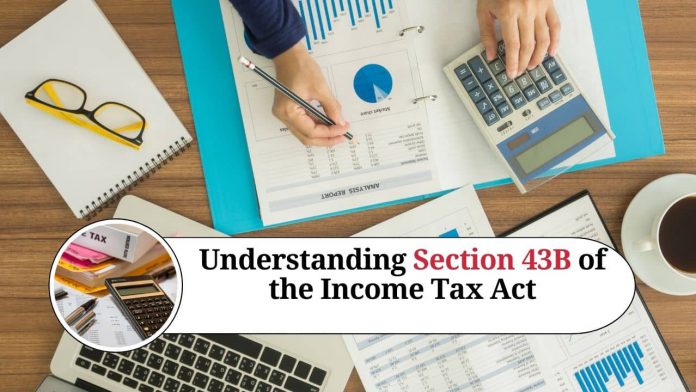Introduction
Section 43B of the Income Tax Act is a critical provision that outlines the rules for claiming deductions for certain expenses. The section applies to various payments, including statutory dues and contributions to employee welfare funds. In this blog, we’ll take a closer look at Section 43B and its various provisions.
What is Section 43B of the Income Tax Act?
Section 43B of the Income Tax Act deals with the allowability of certain expenses. It outlines the rules for claiming deductions for various payments, including:
- Statutory dues
- Employee welfare funds
- Employer’s contribution to the employee provident fund (EPF)
- Gratuity
- Superannuation fund
- Leave encashment
- Other similar funds
Provisions of Section 43B
Section 43B outlines the following provisions:
Accrual Basis of Accounting
Section 43B mandates that certain expenses can only be claimed on an accrual basis. This means that the expenses can only be claimed when they are due and not when they are paid. For example, an employer’s contribution to the EPF is an allowable deduction only when it is paid before the due date of filing the return.
Payment Basis of Accounting
Section 43B also allows certain expenses to be claimed on a payment basis. This means that the expenses can be claimed in the year in which they are paid, regardless of the year in which they are due. For example, if an employer pays a gratuity in a year other than the year in which it is due, the expense can still be claimed in the year in which it is paid.
Statutory Dues
Section 43B specifies that statutory dues, such as taxes, cess, and duties, can only be claimed as a deduction in the year in which they are paid. This provision is applicable to both individuals and businesses.
Employee Welfare Funds
Section 43B allows a deduction for contributions made to employee welfare funds, such as the Employee State Insurance (ESI) fund, the Labour Welfare Fund, and the National Pension System (NPS). However, the deduction can only be claimed in the year in which the contribution is paid.
Employer’s Contribution to EPF
Section 43B allows a deduction for an employer’s contribution to the EPF only if it is paid before the due date of filing the return. If the contribution is paid after the due date, it cannot be claimed as a deduction.
Gratuity
Section 43B allows a deduction for gratuity payments made to employees. However, the deduction can only be claimed in the year in which the payment is made.
Superannuation Fund
Section 43B allows a deduction for contributions made to a superannuation fund. However, the deduction can only be claimed in the year in which the contribution is paid.
Leave Encashment
Section 43B allows a deduction for leave encashment payments made to employees. However, the deduction can only be claimed in the year in which the payment is made. This means that if an employee encashes their leave in a different year than the year in which it was earned, the deduction can only be claimed in the year in which the payment is made.
Conclusion
Section 43B of the Income Tax Act is an important provision that outlines the rules for claiming deductions for various payments, including statutory dues and contributions to employee welfare funds. It is essential to understand the provisions of this section to ensure that you are claiming deductions correctly and avoiding any penalties for non-compliance. If you have any questions or concerns about Section 43B, it is always best to consult with a tax professional.
Read more useful content:
Frequently Asked Questions (FAQs)
1. What is the due date for paying statutory dues to claim a deduction under Section 43B?
The due date for paying statutory dues varies depending on the type of dues. For example, the due date for payment of advance tax is 15th March, 15th June, 15th September, and 15th December. The due date for payment of TDS is generally the 7th of the following month. To claim a deduction for statutory dues under Section 43B, they must be paid before the due date for filing the tax return.
2. Can I claim a deduction for an employer’s contribution to EPF even if it is paid after the due date?
No, you cannot claim a deduction for an employer’s contribution to the EPF if it is paid after the due date for filing the tax return. To claim a deduction, the contribution must be paid before the due date.
3. Can I claim a deduction for leave encashment made to an employee in a different year than the year in which it was earned?
Yes, you can claim a deduction for leave encashment made to an employee in a different year than the year in which it was earned, but only in the year in which the payment is made. This means that if an employee encashes their leave in a different year than the year in which it was earned, the deduction can only be claimed in the year in which the payment is made.
4. Can I claim a deduction for a contribution to an employee welfare fund if it is made after the due date?
No, you cannot claim a deduction for a contribution to an employee welfare fund if it is made after the due date. To claim a deduction, the contribution must be made before the due date for filing the tax return.
5. Is Section 43B applicable to individuals as well as businesses?
Yes, Section 43B is applicable to both individuals and businesses. The provisions of the section apply to various payments, including statutory dues and contributions to employee welfare funds.




















